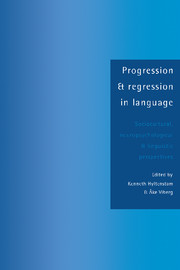 Progression and Regression in Language
Progression and Regression in Language Book contents
- Frontmatter
- Contents
- List of contributors
- Preface
- INTRODUCTION
- THE SOCIOCULTURAL SETTING
- 2 The role of pidgin and creole languages in language progression and regression
- 3 Structure and practice in language shift
- 4 Growing up monolingual in a multilingual community: how language socialization patterns are leading to language shift in Gapun (Papua New Guinea)
- 5 Language change in a creole continuum: decreolization?
- PSYCHO- AND NEUROLINGUISTIC ASPECTS
- THE LINGUISTIC PERSPECTIVE 1: DISCOURSE, GRAMMAR, AND LEXIS
- THE LINGUISTIC PERSPECTIVE 2: PHONOLOGY
- Index
5 - Language change in a creole continuum: decreolization?
Published online by Cambridge University Press: 06 July 2010
- Frontmatter
- Contents
- List of contributors
- Preface
- INTRODUCTION
- THE SOCIOCULTURAL SETTING
- 2 The role of pidgin and creole languages in language progression and regression
- 3 Structure and practice in language shift
- 4 Growing up monolingual in a multilingual community: how language socialization patterns are leading to language shift in Gapun (Papua New Guinea)
- 5 Language change in a creole continuum: decreolization?
- PSYCHO- AND NEUROLINGUISTIC ASPECTS
- THE LINGUISTIC PERSPECTIVE 1: DISCOURSE, GRAMMAR, AND LEXIS
- THE LINGUISTIC PERSPECTIVE 2: PHONOLOGY
- Index
Summary
INTRODUCTION
Decreolization is typically viewed as the process through which a Creole language gradually merges with its lexifier language, i.e., the standard language of the community, as a result of Creole speakers’ increased access to, and ‘targeting’ of, the latter (Andersen, 1983; Bickerton, 1975; DeCamp, 1971; Rickford, 1983). The study of this process, largely motivated over the last 20 years by questions about the consequences of language contact and the nature of language change, has made less mysterious the extensive linguistic variation observed in contemporary Creole communities. Specifically, the proposal that synchronic variation reflects diachronic change in systematic ways (Weinreich, Labov and Herzog, 1968) has received considerable support in cross-sectional investigations (see, e.g., Bickerton, 1973 and 1975; DeCamp, 1971; Rickford, 1979). Perhaps because these studies have yielded significant insights into the systematicity of variation in Creole settings, it has been assumed, rather than demonstrated, that their findings reflect how decreolization actually occurs in real time. Yet, as researchers (e.g., Meisel, Clahsen and Pienemann, 1981) in the field of second language acquisition have convincingly shown, important aspects of interlanguage development can be distorted or inadequately described in cross-sectional studies. Among creolists, Rickford (1983) has discussed this problem most extensively, and emphasized the need for longitudinal studies to document actual patterns and rates of change.
The present paper reports on such a study of Hawai'i's creole continuum, focusing on (1) the decreolization rates of different linguistic and discoursal features; (2) the proposal that substantial decreolization occurs, not over the lifetimes of individuals (as in the case of ‘normal’ second language acquisition), but across generations of speakers (Rickford 1983); and (3) the role of political and socio-psychological factors in decreolization.
- Type
- Chapter
- Information
- Progression and Regression in LanguageSociocultural, Neuropsychological and Linguistic Perspectives, pp. 122 - 144Publisher: Cambridge University PressPrint publication year: 1994


